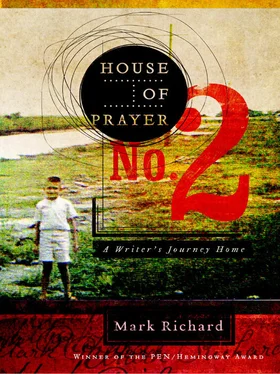Ben tells you that your father is dying in a small hospital down in North Carolina and he wants to see you. It’s been about twenty years since your last communication with him, a single-spaced fifteen-page hand-printed letter dated New Year’s Eve , in reply to a letter you had written months earlier. His letter is in the form of a multiple-choice questionnaire. Sample questions include “At what point in time did God die and you took his place?” and “Where in the Bible is it written that there is no place in Heaven for non-writers?” It is an angry questionnaire and your father closes it with a quote from A Covenant with Death , an out-of-print novel about a man accused of murdering his wife— If you cannot love, pity. If you cannot pity, have mercy. That man is not your brother, he is you . Your wife says you must go see your dying father, and she is right.
It’s a small hospital in a small mill town like the one in which you grew up, and when you see the house where your father and his second wife live, it’s the same three-bedroom brick rancher that is in your hometown where your mother still lives, the same bushes and trees and flowers planted in the same configurations. When you walk into your father’s hospital room, he shoos everyone out and tells you to pull up a chair, he’s ready to make his confession.
NO ONE IN THE HOSPITAL who knows you are your father’s son seems to like you. Not at all. When you meet your father’s doctor, the first white person you have met in the place, you ask him about your father’s condition, what his chances are, and the doctor says, Why don’t you just make your peace and hit the dusty trail?
Your father’s wife is there and his stepdaughter, and they are perfectly nice. Your stepmother says she had thrown your father out of the house just before all this happened. He had wrecked his truck, drunk, and split open his head. He had spent a night in jail, making friends there telling jokes in his orange jumpsuit.
At his bedside your father says he wants to talk himself to death. He says he’s ready to die, what do you think about that? Before you can answer, he says, Everything is could have, could have, could have .
They start giving him morphine. You ask him if his pain is specific or general, and he says, It’s endless .
He asks you if you remember taking the St. Francisville ferry across the Mississippi with your grandfather, and you have a vague recollection of bright light on shallow water and watching your father and his father eat shrimp and drink beer in a place on pilings where you could see the river between the floorboards, and then your father starts talking about you as if you were someone else. He says you turned out all right in spite of it all. He says he can’t figure out what made him trip off the end of the dock. He looks at you and asks, Are you me?
You tell him your name. You say you are his son.
Who is that grey-haired man standing in the corner of the room? he asks you, and you don’t turn to look, because you know there’s no one there. There’s a cat in the room , says your father, I can hear it .
YOU TAKE A ROOM at a motel across the street from the hospital. Often when you go over, your father is sleeping. When he’s awake, you’re careful to let him spend time alone with his wife and stepdaughter. A black nurse finds you leaning against a wall in a hallway staring at your shoes. She tells you to be sincere in your forgiveness and walks on. When you see your father again, he says he’s down to the bottom of the deck.
When your father is lucid, you ask him about all the work he did on the lake property. He says the black man who sold him the lake property feared retribution if he allowed your father to build an access road through his property. That’s why your father hired so many local black workers to help him, the black stonemason who built the beautiful wall that was the only landmark on the lake for years. When the black road contractor lost the bid to pave the road, he wanted to see the numbers of the winning bid. As your father tells you this story, he begins to search through the top sheet on his bed looking for the paperwork from forty years before. Save all these bits of paper , he tells you; he says he wants to read the history later. When you try to ease out the door, he says, Nobody likes to be left out, is what I’m trying to say, please?

YOUR FATHER IS DYING, and he is angry with his own father. He tells you a trip to his father’s grave affirmed all the hunches he’s always had, but he won’t say about what. He says he had a little room off the garage to build his radios and his father took it over to work on his clocks. Your father is getting himself agitated. His wife says for him to think of a quiet safe place, and he settles down. You ask him what place he’s thinking of, and he says it’s a stand of bamboo in the back corner of his house where he used to hide when he was ten years old.
One morning you go to the hospital, and there’s a rush of people in and out of his room. Your father says he’s going, right now, call a priest. You ask a nurse to call the local Episcopal priest as you and your stepmother try to comfort your father. A little while later a large black man in vestments comes in, and your father rallies to ask, Who the hell are you? There’s been a mix-up; the nurse called the African Methodist Episcopal church by mistake. The pastor says he can still pray for your father, and your father tells him to get out. Your father’s anger rejuvenates him, and it’s good to see. Now the pastor is angry, saying that maybe your father could at least pray for all of us, since people close to death are closer to God, and your father refuses to pray for anyone, and you can tell that if he had the strength to get out of bed and bum-rush the pastor out the door, he would.
You get ahold of Ben, and Ben comes as quickly as he can. Your father is glad to see him. With you standing there, he tells Ben that it’s going to be hard to say goodbye to you this time. He says you’re a lot like him and that’s what scares him. Your father apologizes for not dying. He says he got his times mixed up.
Your father slips deeper and deeper into the morphine. The last night you remember having a conversation with him, the movie Carousel was playing on the overhead TV with the sound off, and your father was watching it intently. He motions for you to come over, and when you do, he whispers, Who are those two men folding that shroud in the corner?
After that your father sleeps and sleeps. You go across the street to a funeral home and make arrangements with the undertaker. Your father has said he wants his ashes to be scattered offshore of the Outer Banks. The undertaker has just installed a new crematorium; your father will be the first to go through it unless someone else dies in the next day or so. The undertaker tells you about a sixteen-year-old boy who was just visiting two weeks before on a school trip, the teacher wanted to show the students what life on the streets could lead to, and at that time the sixteen-year-old boy had laughed the loudest when they toured the embalming room, and now the sixteen-year-old boy is in the back on the table himself, draining.
YOUR FATHER HAS BEEN ASLEEP for two days and two nights; you don’t know what to do. You have a feeling that they will keep upping the morphine drip until it’s over. You’ve been there two weeks. He may never wake up.
Читать дальше













